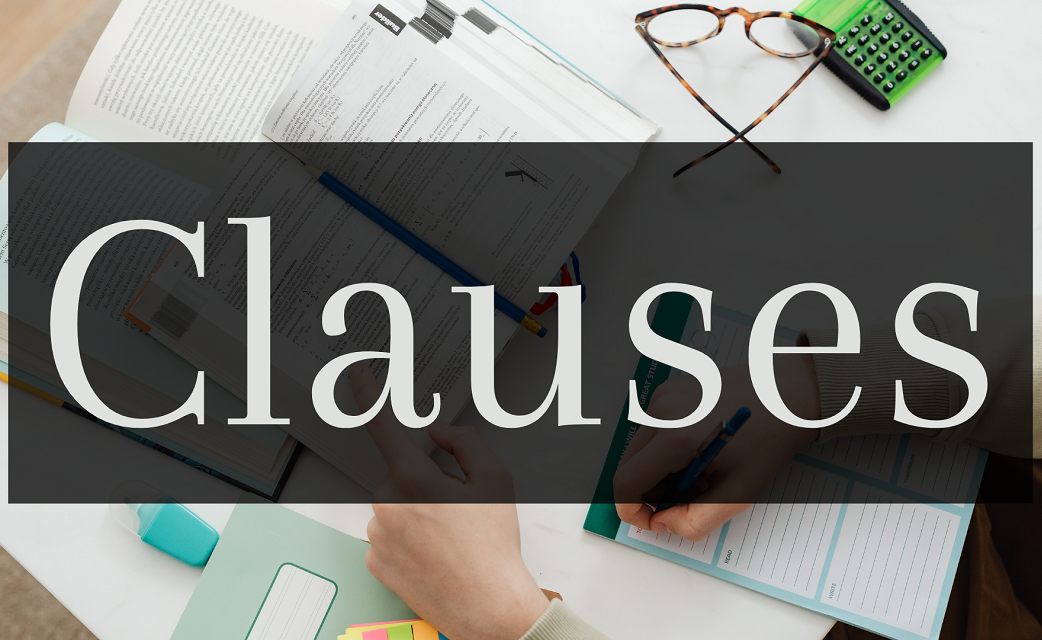A Note:
The way that we teach grammar in schools doesn’t always match how we use language in real life.
When I write something like “a sentence must have at least one verb,” you might think “well, not always.” Exactly! Language in real life doesn’t really follow simple rules all the time.
Here, I want to try to explain some of the grammar rules that schools expect kids and young people to learn so that they can succeed in their exams. It might not match how you speak and write at home, and that is normal!
Question: what is a ‘clause’?

A clause is a group of words that follows certain rules. We use clauses to make sentences. There are two kinds of words that a clause must have, but it can have other words as well as these. The kinds of words a clause must have are:
A subject (Normally a person, place, or thing that does an action)
A verb (A word that tells us an action. Examples: dance, see, breathe, shine, be)
Examples:
I sleep.
We run.
The sun shines.
The wall crumbles.
It must also be a finished thought. So, “I want” wouldn’t be a clause, because we need to know what the person wants so that the idea can be complete.
Question: is a clause just a sentence?
A clause could be a whole sentence on its own, or just part of a sentence. For example:
The cat eats
This is an independent clause, as it has someone (the cat) doing something (eating).
After we leave
This is a subordinate clause, because it is only part of a sentence and doesn’t make sense on its own. What is happening after we leave? If we only have this clause, we don’t have all the information about what is happening.
Note: in real life, we use subordinate clauses as full sentences ALL THE TIME. It’s not wrong. You will even find them in official things like books and newspapers! However, school grammar rules say that a subordinate clause cannot be a full sentence on its own.
Most subordinate clauses will start with either a subordinating conjunction or a relative pronoun. This is, I think, the easiest way to find them in a test.
Another example of a clause is this one:
The cat eats the mouse.
This is another independent clause, because it makes sense on its own. However, there is something other than the subject and verb here: an object. The cat is the one eating, but the mouse is being eaten. So, the mouse is the object of the sentence.
On Sundays, they usually walk to the local shop.
This is a slightly longer independent clause. It’s still one clause, as there is only one verb.
These examples are not clauses:
The lovely bird in the tree
Why? There is no verb.
We left and we got the bus
Why? There are two things happening, so this is actually two clauses. 1. We left. 2. We got the bus.
I take
Why? It’s not finished, we need to know what they take.
Question: Sometimes there is more than one verb, though. Why?
Sometimes in a sentence you will see an extra ‘is’ or ‘do’ or ‘has’ along with the verb.
Examples:
He is running
The sun has risen
Do you understand?
These extra words are auxiliary verbs. They give us extra information about the main verb.
It rains = generally, sometimes, rain happens.
It is raining = rain is happening RIGHT NOW.
It will rain = sometime in the future, rain will happen.
There are many different auxiliary verbs, with different uses. Words in these families are often auxiliary verbs:
‘to be’ (am, are, was, were, is)
‘to do’ (do, does, did)
‘to have’ (have, had, has)
Verbs like might, may, could, should, would, will, and must are also auxiliary verbs, but they have their own name: modal verbs.
It’s one clause if there’s only one thing happening.
Examples:
The rain pours down.
(One thing, the rain is pouring)
The rain was pouring down.
(One thing, the rain was pouring)
On a cold day in April, the rain was pouring down.
(One thing, the rain was pouring)
“On a cold day in April” isn’t a clause. Why? There is no verb!
On a cold day in April, the rain was pouring down and the wind was howling.
(Two things, the rain was pouring and the wind was howling. This is two clauses)
When a sentence is made up of just one independent clause, we call this a simple sentence.
Now, try this short quiz! Can you identify the different clauses in these sentences?
1. The sun was shining and Gordon was playing in the garden.
Answer: The sun was shining and Gordon was playing in the garden.
Why? There are two main verbs (‘shining’ and ‘playing’).
The auxiliary verb ‘was’ is there as well, but it doesn’t count as a main verb. Two different things are happening, therefore there are two clauses split up by ‘and’.
2. In the city of Atlantis, the mermaids gathered for a meeting.
Answer: In the city of Atlantis, the mermaids gathered for a meeting.
Why? There is only one verb, “gathered”, and they are only doing one thing.
The phrase “In the city of Atlantis” is just telling us where they are doing it, so this would be called an adverbial (if you know your word classes, this is because it works like an adverb. If you don’t, don’t worry, there’s another post coming about that!)
3. While the others did their homework, Aarav and I snuck out.
Answer: While the others did their homework, Aarav and I snuck out.
Why? This is two clauses, a subordinate clause and then a main clause.
We know it’s two clauses because two things are happening (some people are doing homework, and Aarav and the speaker are sneaking out) and there are two verbs that show this (“did” and “snuck”).
“While the others did their homework” is subordinate, and we can tell because it starts with a subordinating conjunction (“while”). I’m planning a whole post on conjunctions that will help with subordinate clauses!
Let’s finish with a question from a KS2 SATs paper. You can use “while” to add a subordinate clause. Remember that for it to be a clause, it has to have a verb!

Thank you for reading, I hope you feel a bit more confident now with the idea of what a ‘clause’ is, and that might either help you or someone you are helping! Please leave a comment if you have any questions. If you are looking for more detailed and personalised tuition, please check out the services page for a breakdown of all the things I can offer! Have a fab day.

